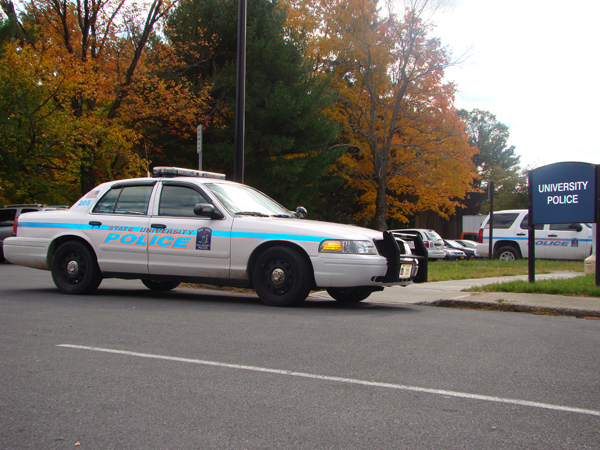

While attempts have been and are continuing to be made to create a more amiable relationship between police and students, many students believe that not enough effort towards progress is being made.
In the past groups such as the University Police Committee, whose members are approved by the student senate, have attempted to improve relationships between police and students. Numerous meetings have been held between students and the university police in hopes of doing just that.
The intention of the meetings was to facilitate a dialogue between police and students, so that problems and concerns on both sides could be effectively remedied. Members of the department, such as Lieutenant John Coxum and Chief Raymond Bryant have been involved with the discussions.
This year, the Criminological Theory class is trying to organize a panel for a program held this December.
“Each member of the panel is going to have 15 minutes to speak about their own interpretations of issues between officers and students and afterwards, there will be workshops for first-year students,” said Student Association (SA) Vice President of Academic Affairs and Governance Caitlin Ryan. “The feeling of this program will be more focused [on] what we can do as students, and what role we can play as opposed to always putting the pressure on the police officers themselves.”
However, Ryan feels that while officers such as Coxum make an effort to understand student concerns and engage in dialogue, other officers have yet to do so. Students on the panel were actually told by an advisor not to bother asking officers to join the discussions because they probably wouldn’t come, she said.
“Last year, one of the last things we tried to do was have specific officers come in [who] students had complaints about,” Ryan said.
According to Ryan, some of the officers didn’t respond to e-mails and never showed up.
Coxum, who has been heavily involved in working to improve police-student relations on campus, agreed the meetings weren’t as successful as they could have been. What was supposed to be a learning experience for the two groups, Coxum said, turned into a “police bashing session.”
Criminology Program Coordinator Eve Waltermaurer said students who participate in programs with police are more likely to have positive experiences and opinions of the police. Waltermaurer also believes police need help getting students to join such programs because many aren’t heavily attended. Waltermaurer also said students need to better comprehend the duties of police, and how they are critical to creating a safe place for all to live in.
Some students, claim to have been victims of police mistreatment.
Anthony Lino, SA’s vice president of programming, claims the police have not only been over zealous, but have displayed racism on occasion as well.
“In terms of student relations, it’s evident to see there’s a big societal issue that still needs to be addressed, and that is racism,” Lino said. “A lot of officers have no prior experience in dealing with other cultural perspectives, so I believe that some type of better method of dealing with students of color would be better implemented, because I have heard racial slurs not only by police on campus but in town.”
Coxum said specific criticisms of police officers shouldn’t be brought up at the panel. Instead, he said, complaints about officer behavior should be reported through a formal process via their website, or by filling out a complaint at the police office.
“A lot of times these things happen to people and they don’t report it,” Coxum said. “When they don’t do that, whoever these officers are that they’re claiming are doing these things, they continue to do it.”
Although relations aren’t perfect, Coxum feels the relationship between police and students is still a good one. And if students start bringing their concerns directly to the department, the department will be able to address them. He also wished to dispel the myth that police are constantly out to catch students in the act of illegal activity.
“People think we’re there to bother them. We get called most of the time,” he said. “The cops are not these magical wizards who just show up when there’s bad things going on.”
Coxum believes that in order for relations to improve, students need to start treating the police less like enemies, and more like people who are there to help.
“Just say hello,” he said. “A lot of times, we don’t get that public interaction. We don’t get that thanks or appreciation.”
